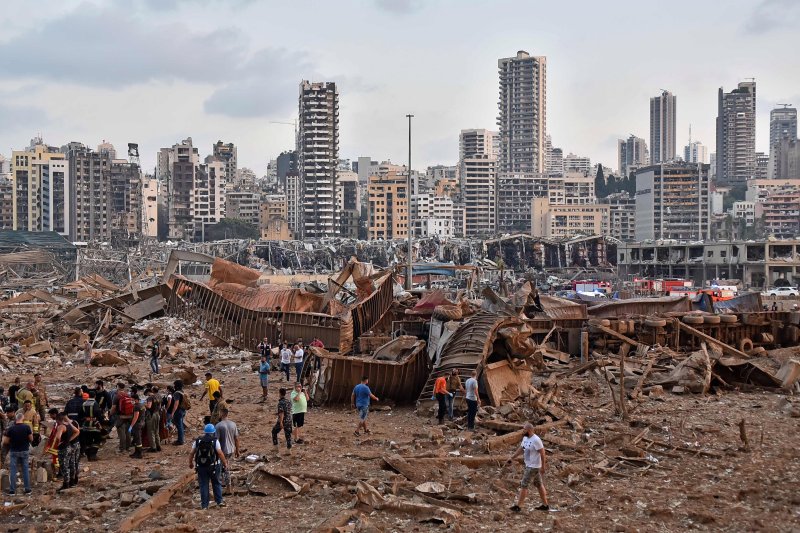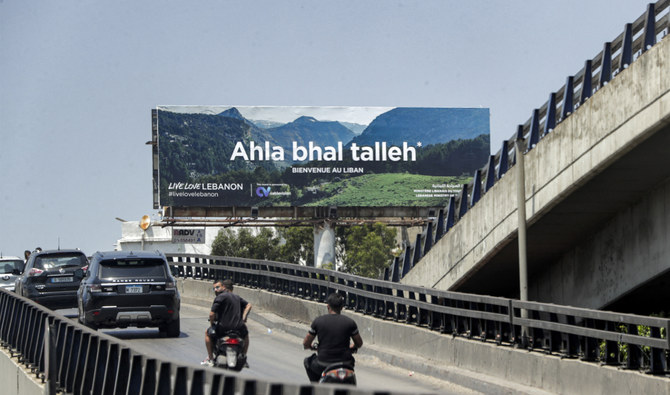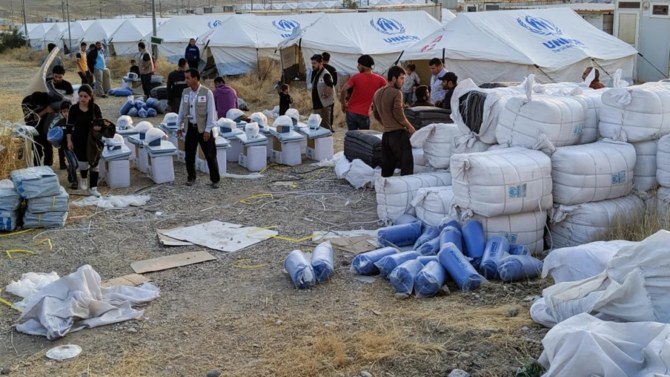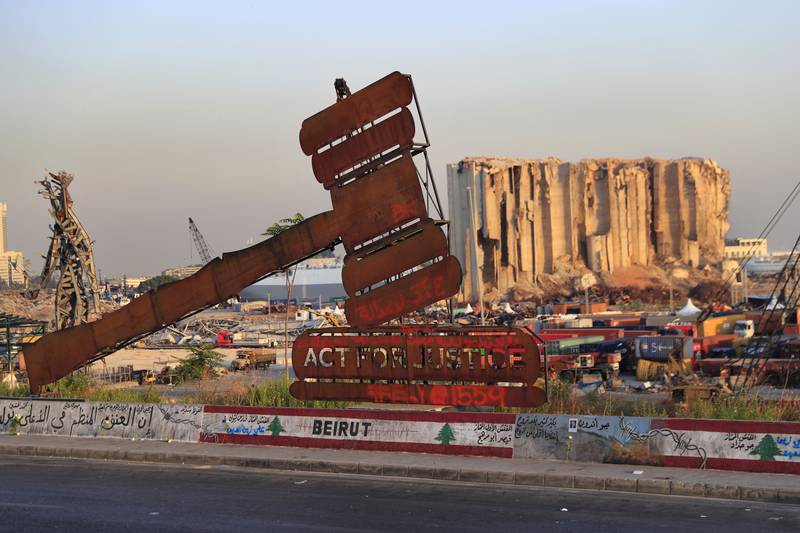BEIRUT (AP) — A Saudi opposition party says one of its founding members was killed in the Lebanese capital, Beirut. The National Assembly Party said Sunday that founding member Manea Al-Yami was slain in “complicated circumstances.” The Lebanese Internal Security Forces say in a statement that Al-Yami’s two brothers stabbed him to death in the […]

by Najia Houssari — arabnews.com — BEIRUT: Political officials in Lebanon’s ruling class came under fire on Saturday for suffering from “a moral crisis and the love for power” as the country celebrated Eid Al-Adha. The officials had apologized for not receiving any well-wishers on the holy occasion “due to the circumstances Lebanon is going through.” Dar al-Fatwa secretary Sheikh Amin Al-Kurdi condemned them during the Eid sermon. “The dignified, self-respecting people will not break in front of your corruption, thefts, and complex sick selves. You wasted their wealth and resources,” he said before hundreds of worshippers in the Al-Amin Mosque in the center of Beirut. “There’s no electricity, no water, no medicine, and no bread. Everything is obscenely expensive, and life has become arduous and compelling. “The people will remain, but the black pages of history will curse you generation after generation,” added Al-Kurdi, who led the Eid prayers instead of Grand Mufti Sheikh Abdul Latif Derian. The grand mufti is in Saudi Arabia to perform the Hajj.
Al-Kurdi said the Lebanese officials suffered from “a moral crisis and the love for power.” In his sermon, he asked: “Where is the prosecution of the killers of the martyred Prime Minister Rafik Hariri following the ruling of the international tribunal? Where’s the investigation into the Beirut Port blast? Where are the people’s financial rights lost in banks? Where’s the water, the electricity, the medicine, the food, and the fuel? Where’s the feeling of security and tranquility? When the captain of the ship is troubled, all the passengers will feel insecure.” Lebanon entered the holiday phase on Saturday ending next Tuesday. Political activities to form a new government were halted, and work on controversial matters was suspended. Prime Minister-designate Najib Mikati has not visited President Michel Aoun during the past couple of weeks to continue consultations over the draft Cabinet lineup and Aoun has yet to respond to Mikati’s proposed draft Cabinet.

by catholicweekly.com.au — Dr Margaret Ghosn mshf — Elias Boutros Howayek, born 4 December 1843 in Helta, North Lebanon, went on to become a priest (1870-1899), bishop (1889-1899) and Maronite Patriarch of Antioch (1899-1931).
Elias is considered one of the four founders of modern Lebanon alongside Fakhr el Din II, Bashir II and Youssef Beik Karam.
Elias Boutros Howayek’s Ordination to the Priesthood occurred on 5 June 1870 in Rome. He was of the view that:
- minimal education impoverished chances of advancement
- the neglected lacked dignity
- an occupied country experienced poverty of freedom
- distance from God was poverty of the human
As such, Elias committed his life to removing the causes of poverty and hardship from society.

By Najia Houssari — arabnews.com — BEIRUT: Saudi Arabia’s decision to drop COVID-19 restrictions for passengers traveling from Lebanon will provide great momentum for air traffic between Beirut, Riyadh, and Jeddah, an industry leader said on Friday. Jean Abboud, head of the Syndicate of Tourism and Travel Agencies, told Arab News that airlines had started programming their flights to Riyadh and Jeddah from Beirut. Most people were relieved by the move, he added. Saudi Arabia’s ambassador to Lebanon, Walid Al-Bukhari, tweeted on Thursday evening about the decision, as the Kingdom lifts precautionary measures during the Hajj season.
Lebanon’s caretaker Tourism Minister Walid Nassar thanked the Saudi leadership for allowing people to fly directly from Lebanon without the need to spend 14 days outside the country before entering Saudi Arabia. Nassar added that the Kingdom had always stood by Lebanon and the Lebanese, taking decisions that were “in the interest of our country.” Abboud said that previous measures had prevented about 60 percent of Lebanese people living and working in Saudi Arabia from returning directly from Beirut. “So they became more reluctant to fly out to Lebanon.
The Lebanese community in the Kingdom is quite large, and the Lebanese used to fly to Beirut very frequently, sometimes every weekend. However, the condition requiring them to stay 14 days in another country before returning to Saudi Arabia became a major waste of time and money. “Airlines are adjusting their flights to the Kingdom in light of the decision, especially since large numbers of Lebanese are currently spending their summer vacation in Lebanon and wish to return via a direct flight to Saudi Arabia.” MP Bilal Al-Hashimi thanked Saudi Arabia for its decision. He said: “We are happy to return to the Kingdom of goodness, humanity, love, and giving, which has always been an example for Arab brotherhood. We all yearn for more such decisions that we are accustomed to from the Kingdom that has never left Lebanon. Rather, it has always provided support and aid, and it will always do so, especially in these virtuous days.”

By Najia Houssari — arabnews.com –– BEIRUT: Lebanon has decided to formally negotiate refugee repatriation with Syria, a minister in the caretaker government said on Thursday. The Minister of Displaced Affairs Issam Sharaf El-Din said he would visit Damascus after the Eid Al-Adha holiday, making him the first Lebanese minister to visit the Syrian capital in an official capacity since 2011. Sharaf El-Din will discuss the plan to repatriate Syrian refugees in stages and “secure the executive mechanisms” for their return. He confirmed he had an official mandate from President Michel Aoun and caretaker Prime Minister Najib Mikati for the Syrian refugee issue.
BACKGROUND International organizations were trying to obstruct this issue by threatening to not help refugees if they returned to their country, said Minister of Displaced Affairs Issam Sharaf El-Din. According to Sharaf El-Din, the plan stipulated “the repatriation of 15,000 refugees per month” because Lebanon believed the war in Syria had ended and the country was safe. “Lebanon will not accept the non-return of Syrian refugees to their country.” Lebanon, which is already in crisis, says Syrian refugees are a heavy burden on basic services and infrastructure. According to Lebanese protesters, the refugees shared “our bread, which has turned into a rare commodity, and people are scrambling to get it in the past days.” Lebanese ministers have previously visited Damascus and met Syrian officials, despite the suspension of Syria’s Arab League membership, but they have been keen to stress the visits were personal.
by un.org — The following Security Council press statement was issued today by Council President Ronaldo Costa Filho (Brazil): The members of the Security Council took note of the appointment of Najib Mikati as the new designated Prime Minister on 23 June, as well as the presentation by the latter of his Government line-up to […]

By Barak Ravid — axios.com — The Biden administration pressed the Lebanese government to criticize Hezbollah’s attempt to send drones to an Israeli natural gas rig in the Mediterranean and to commit to resolving the maritime border dispute with Israel only through negotiations, sources briefed on the issue told Axios. Why it matters: The U.S. is concerned Hezbollah’s actions will sabotage its efforts to broker a deal between Israel and Lebanon on the maritime border by September. Lebanon and Israel each claim a potentially gas-rich, 330-square-mile area off their borders in the Mediterranean Sea. Driving the news: The Israeli military on Saturday shot down three Hezbollah drones headed toward the Karish gas rig. Hezbollah said it launched the unarmed drones on a reconnaissance mission meant to send a “message” to Israel.
Behind the scenes: U.S. energy envoy Amos Hochstein and U.S. ambassador to Lebanon Dorothy Shea spoke to senior political and military leaders in Lebanon over the weekend. They raised concerns about the drones incident and asked the Lebanese government to publicly speak against it, sources briefed on the issue said. According to the sources, Hochstein told several senior Lebanese officials that progress in the maritime border dispute with Israel will be achieved only through negotiations and not through provocations by Hezbollah. What they’re saying: After the U.S. pressure, caretaker Prime Minister Najib Mikati and Foreign Minister Abdallah Bou Habib on Monday issued a statement committing to the U.S.-led negotiations and criticizing Hezbollah without directly mentioning it by name. “Any act that falls outside the framework of the state’s responsibility and the diplomatic track within which negotiations are taking place, is unacceptable and exposes [Lebanon] to unnecessary risks,” Bou Habib and Mikati said.

سجعان قزي
@AzziSejean
لا شكَّ أنَّ لدى المعنيّين النيّةَ الصادِقةَ لعدمِ تأليفِ حكومةٍ جديدة، ولا يَتورَّعون عن إعلانِها كلّما سَنحَت لهم المنابِر والحناجر. يَتوزَّعون، مع القوى السياسيّة، صلاحيّاتِ تعطيلِ المؤسّساتِ الدستوريّةِ كأنَّ التعطيلَ أصبح حالةً ميثاقيّة. كان المسُّ بمؤسّسةٍ دستوريّةٍ جريمةً لا تُغتَفر فصارت، في السنواتِ الأخيرة، وِجهةَ نَظر. كانوا يُقْدِمون عليها بخفَرٍ فصاروا يُجاهرون بها بوقاحة. كانوا يَجهَدُون لتأليفِ حكومةٍ جديدةٍ، فصاروا يَلتمِسون اجتهاداتٍ دستوريّةً من كلِّ صَوبٍ لتعويمِ حكومةٍ مستقيلة. كانت المنافسةُ لإشغالِ مناصبِ هذه المؤسّساتِ، فأمْسَت لتفريغِ المؤسّساتِ بحدِّ ذاتِها. دولةٌ في طورِ الأُفول قبلَ الاتّفاقِ على بديل.
أصلًا الدولةُ الأصيلةُ، دولةُ لبنانَ الكبير، عَدّها البعضُ دولةً بديلة. كان لبنانيّون يَعتبرونها بديلًا عن جبلٍ أشمَّ ما زال يُراودُ عِزّتَهم، وآخَرون بديلًا عن وِحدةٍ عربيّةٍ أو إسلاميّةٍ حضاريّةٍ هامدةٍ في الوِجدانِ، ومع حزبِ الله أُضيفَ مفهومُ الدولةِ الرديفةِ لإيران الخُمينيّة. واللافتُ الـمُحزِنُ أنَّ لبنانَ ما شارفَ في تاريخِه الحديثِ على السقوطِ الكيانيِّ أكثرَ ممّا حينِ تَـمَّ الاعترافُ به “وطنًا نهائيًا”. في ظنّي، سببُ هذه الظاهرةِ الغريبةِ هو أنَّ الاعترافَ بنهائيّةِ لبنان تَرافقَ مع تغييرِ هُويّتِه، والخروجِ عن الحِياد، وتقويضِ انتظامِ مؤسّساتِه الدستوريّة، والانتقالِ مباشرةً من عدمِ الولاءِ للبنان إلى الرغبةِ في امتلاكِه من دونِ المرورِ بالولاءِ الحقيقيِّ والصادقِ والصافي. من يومِها صار التعيينُ قاعدةَ الديمقراطيّةِ اللبنانيّةِ والانتخابُ استثناءَها، وأصبَحت المؤسّساتُ الدستوريّةُ نوعًا من الكماليّاتِ أو الـمُتمِّمات.

by Nada Homsi | Jamie Prentis — thenationalnews.com — Dozens of protesters angered by the rapid deterioration of living standards in Lebanon marched through the capital Beirut on Tuesday evening and attempted to break into the headquarters of MTC Touch, one of the two state-contracted telecoms companies. The demonstrations, in which a handful of protesters clashed with security forces, came days after a major jump in the cost of phone and internet services — the latest price rise in a country suffering from inflation of more than 200 per cent. To attend the protest, demonstrators Bassil Hatoum, Maan Moghrabi and Yaman Moghrabi had to split the petrol bill on their way from Kfar Silwan, a village more than an hour away from Beirut. Anger in Lebanon as struggling telecoms sector increases rates “We can’t afford to get here without splitting it. And that’s just us,” said Mr Hatoum, a 27-year-old music manager. “Imagine all the people who can’t afford to come to these protests because they can’t afford the petrol to get here.”
Lebanon’s economic collapse, which began in 2019, has caused about 80 per cent of Lebanon’s population to slip below the poverty line. Dire shortages of basic goods and services have plagued the state in the years since. State electricity is nearly nonexistent, so the majority of Lebanon’s population relies on expensive private generator subscriptions for backup electricity. These are powered by diesel, itself often a scarce commodity in the troubled nation. Water, bread, fuel and medicine are also often in short supply and the local currency has plunged in value by more than 90 per cent. “They’ve brought us to below poverty and somehow they’re still in power,” Mr Hatoum said, referring to Lebanon’s political elite, many of whom transition from their roles as warlords during the country’s civil war — which ended 30 years ago — to national leaders. Mr Hatoum described them as “mafia leaders”. “They’re experts at staying in power through clientelism,” 32-year-old Mr Moghrabi, another of the protesters, added. “No one is comfortable, except for those with money or people who benefit directly from having the political class in power.”
by aawsat.com — Lebanon’s top Christian cleric has reiterated demands for politicians to speed up the formation of an all-party government and elect a new president to pull the country out of rock bottom. “The government shall be inclusive, inspire confidence through its national approach, and seriously address some outstanding issues,” Maronite Patriarch Cardinal Bechara […]



